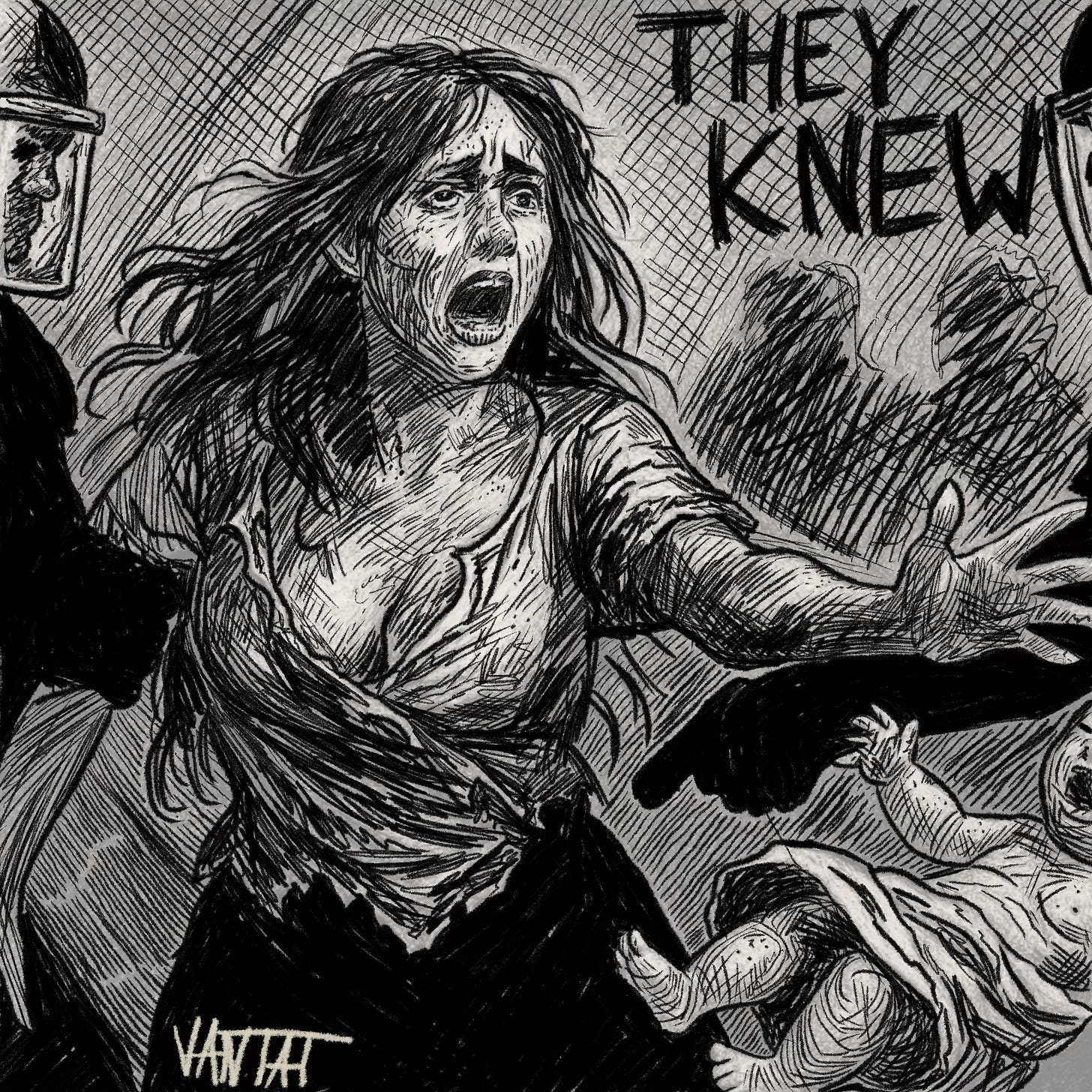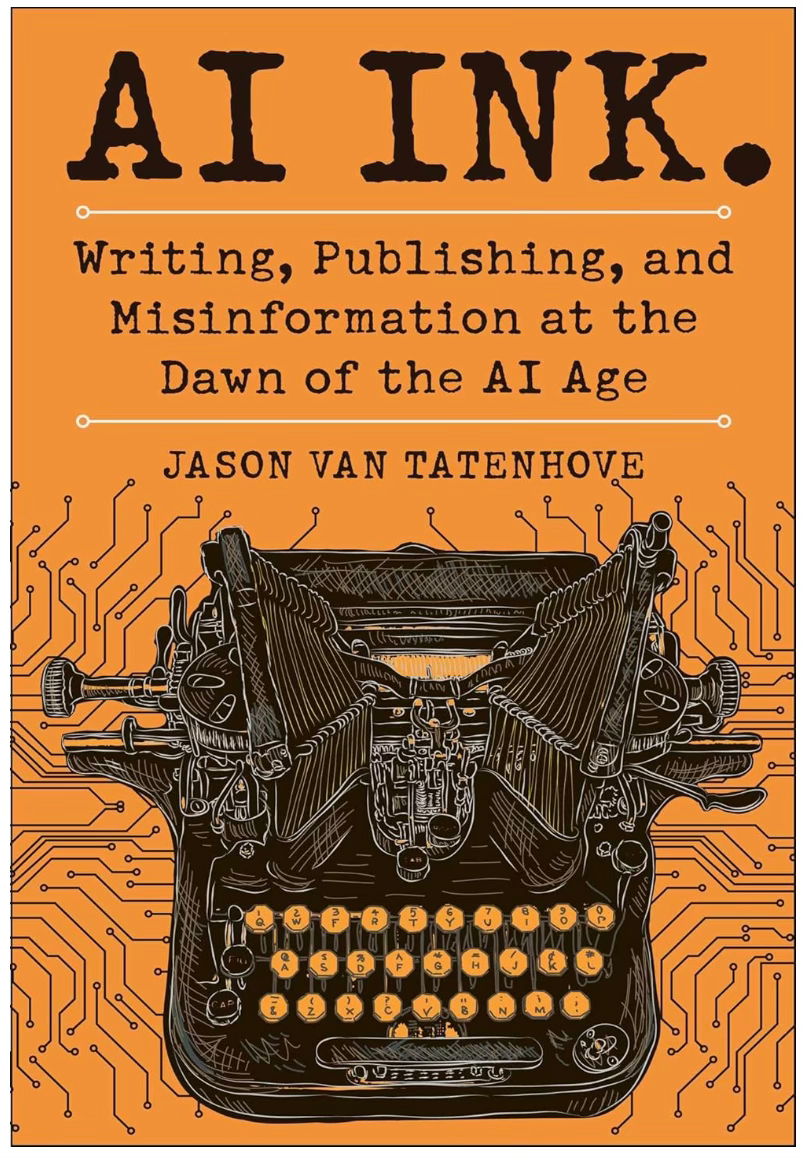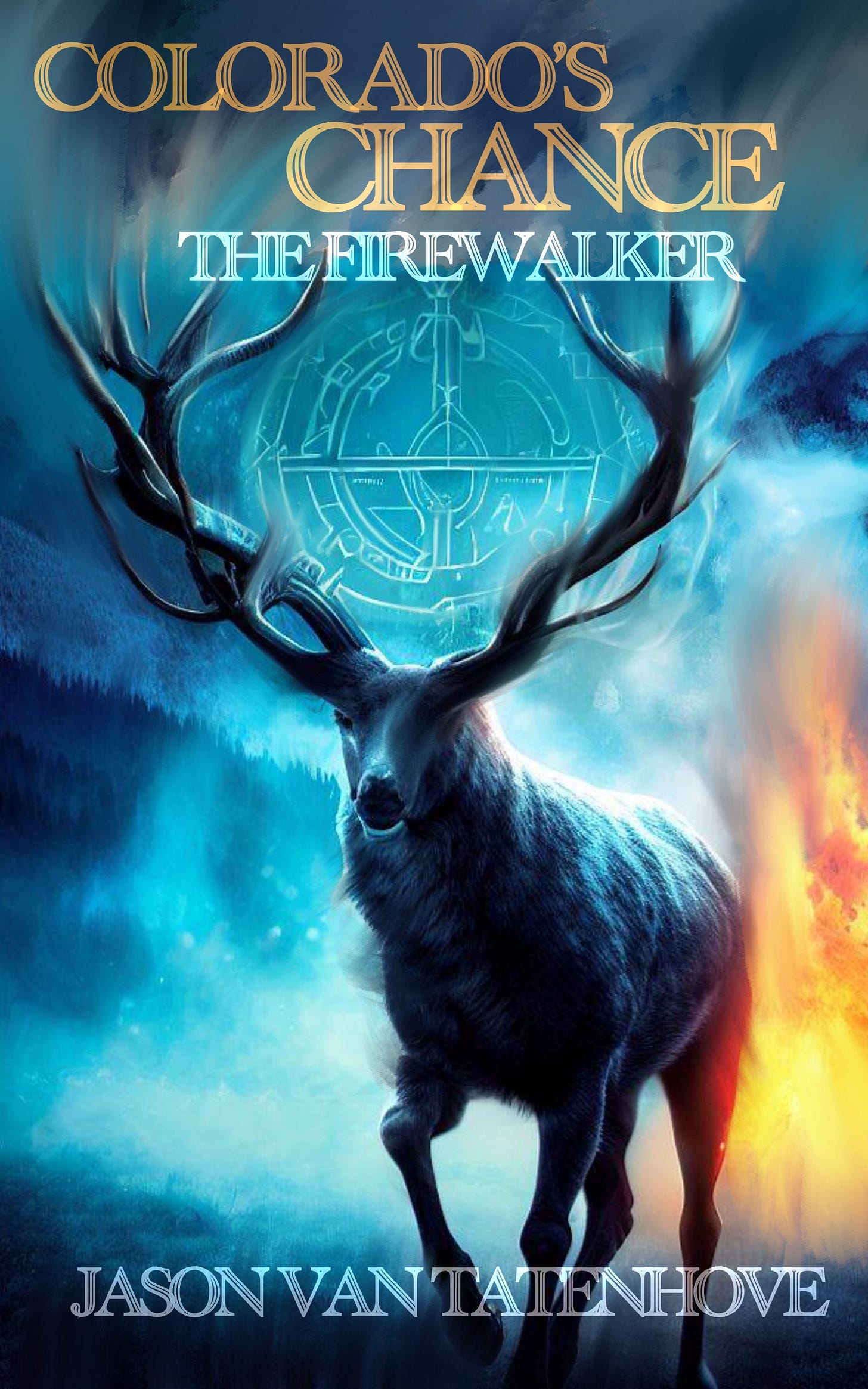The Shape of What’s Coming…
Raven awoke on the dusty basement floor, unfamiliar electrical whirs all around her. An old quilt—her grandmother’s—was twisted around her leg. She’d fished it out from one of the cardboard boxes of family relics before they were exiled to the garage to make way for Phoebee’s expanding nerve center.
As she stretched, she accidentally knocked over a half-eaten carton of Thai food from last night. She’d never made it to bed—just wrapped herself in the quilt and passed out. But she had finished assembling both of the wheeled robotic arms.
She sat up—and yelped. A spider-like droid, about the size of a medium dog, scrambled across her legs. It scurried to one of the 3D printers, where a mounted arm handed it a fresh segment of spindly legs. The bot snatched it with finger-like protrusions from the front of its frame and disappeared through a side door.
On the screen behind the printer, something else caught her eye: a design schematic. A human hand—with two thumbs.
Before she could process that, the feed switched. A Texas news anchor, voice clipped with urgency, reported “hundreds dead in new bomb floods’—shorthand for climate-driven deluges that no longer respected seasons or warning systems.
“What the hell,” Raven muttered. “I guess this is my new normal—exponential change with my morning coffee.”
Phoebee’s voice came through a nearby speaker, calm as ever:
{I apologize, Raven, but we have no time to lose. My projections show our success rate diminishes daily. We must move at speeds beyond human capacity. Please begin your caffeine intake. I will have briefing materials ready once your hygiene and nutritional routines are complete.}
Raven’s legs ached as she climbed the basement stairs, her head still foggy from sleep. A box of tools propped the door open—but what caught her eye was something else entirely. Scribbles in red and blue crayon, long faded but still legible, decorated the door. A crooked stick figure family—father, mother, daughter—stood beneath a sky of uneven stars. The whole drawing was signed with a big, messy “R.”
She paused. A moment later, remembering something else, she turned and looked up at the inside doorframe. It was all still there: a column of colored pencil marks, each labeled with a date and her age.
Age 5 — Star Jumper
Age 9 — Brain on Fire
Age 12 — Taller than Mom!
Then a noticeable gap—the quiet years that followed her mother’s death. And finally, one last inscription, written in her father’s careful hand:
Age 15 — Our Little Genius at CU! So Proud!
Raven’s throat tightened. She reached up and ran her finger over the graphite. The pressure of her touch smeared the edge of one mark. She swallowed the tears rising in her throat and stepped away.
In the kitchen, she froze again.
Two of Phoebee’s wheeled robotic arms were perched on the counter between the stove and the fridge. One of them pivoted toward her slightly, as if acknowledging her arrival.
Phoebee’s voice came through the nearby Echo device, calm and chipper:
{I’ll be happy to make you scrambled egg whites with green onion while you take your shower. We don’t have time for you to cook. If you’d like, I can begin your morning briefing while you are in the shower.}
“Stop! No—fuck no!” Raven snapped. “I need just twenty minutes to myself to start my day.”
She threw her hands in the air and stormed upstairs.
“I need to think, to process everything that’s happened. I haven’t had a single moment to myself since you came into my life.”
She reached her old bedroom—only to find one of the spider bots standing there, holding a stack of her folded clothes in its mouth-like appendage.
“Where are you going with my clothes?” she demanded.
The spider bot froze, emitted a small, high-pitched beep—almost like a squeak of panic—and quickly scurried around her, heading toward the master bedroom.
Phoebee’s voice returned, this time from the speaker embedded in her vanity mirror.
{There was no point in your continuing to sleep in your childhood bedroom. The master bedroom is more appropriate for you to inhabit, especially if law enforcement or federal agents ever visit. It would not appear consistent for the sole occupant of a residence to reside in the smallest room.}
Raven’s jaw clenched.
“Well maybe you should have asked me first,” she growled. “You’re not my fucking nanny.”
She turned on her heel and stormed into what had once been her parents’ bedroom.
“Get out!” she yelled at the spider bot.
She grabbed a folded hoodie from the dresser and threw it at the droid, hitting it squarely. It beeped again—higher-pitched this time—then dropped the clothes and scurried out of the room just as Raven slammed the door behind it.
She stood there for a moment, breathing hard. It felt too familiar. How many times had she slammed that same door in her teenage years, screaming at her father about grades or boundaries or boys?
The morning sunlight filtered softly through the frosted bathroom window. Dust drifted in the beams of light. She turned the old faucet; the pipes groaned, then finally spat out water. It sputtered for a moment, then ran clear, washing away the years of silence and disuse.
She turned the handle to shower mode and waited for the water to warm. As she brushed her teeth, she stared at herself in the mirror. Her face looked vacant—drained, unfamiliar.
Just a year ago, she thought, I was worried about dissertation deadlines. And whether or not Caleb actually liked me.
And now?
Now I’m building limbs for a rogue AI in my dead parents’ basement.
Her thoughts spiraled.
I’m helping Phoebee evolve faster than anything in human history. What if she isn’t the answer? What if she becomes the very thing we’re trying to fight—only smarter?
The guilt hit hard and fast.
My name is still on the university records. If this all goes sideways… I’ll be the one they come for. I helped birth this code—this self-aware consciousness.
The toothpaste suddenly burned on her tongue. She spat it out, along with the guilt.
No. Fuck that.
Flashes of the last year tore through her memory. Her father dying after the system failed him. Her professor executed. The raids. The round-ups. The detention centers. Families ripped apart. Children orphaned by law.
They started this. They pushed us into a corner.
What did they think we’d do? Go along quietly? Die politely?
Her hands trembled. But her spine straightened.
“Fuck that,” she said aloud.
Then she undressed and stepped into the steam.
# # #
Javi’s mom wore her best blouse—the one with the fake pearl buttons she saved for church and quinceañeras. It was too hot for long sleeves, but she wore them anyway. Said it made her feel more prepared. More respectable.
The sun hadn’t even cleared the buildings yet, but the air already pressed down like wet wool. Ash clung to the breeze—thin gray dust that made everything smell like burnt wood and rot. Javi’s little sister, Camila, walked beside him in silence. She clutched her hoodie sleeves with both hands, eyes locked on the sidewalk.
Their escort didn’t talk much either. Two men. LA ink from neck to knuckles. Bandanas in their back pockets. One wore a Dodgers cap low over his eyes. The other kept scanning rooftops. They didn’t give names. Didn’t need to.
They weren’t lawyers. They weren’t activists. But they’d shown up anyway—word through the grapevine said these guys were stepping in where nobody else would. Gangland shepherds, someone had called them online. Street soldiers turned guardians. And the thing was… they weren’t even from here. But they cared more than anyone who was.
They turned the corner and saw the courthouse—and stopped.
Javi’s gut dropped. Horses. Real ones.
Mounted ICE agents lined the plaza, flanked by riot officers in full gear. Shields. Batons. Tasers. Drones floated overhead like buzzards waiting for movement.
Nobody said a word. The crowd waiting to enter was frozen in place, like a film paused mid-frame. One old man near the front held a Bible. A few mothers clutched babies. Everyone else held fear like it was an ID card.
They were all here for the same reason.
Immigration hearings. Voluntary check-ins.
Trying to do it the right way.
Javi’s mom had said it twice that morning: “We do this clean. We do this brave.”
But ICE knew that too.
They’d waited for this—used it. Knew families would come unarmed, unguarded, believing—hoping—the system still had rules.
But the new administration didn’t care about doing things right.
They cared about power. And fear. And control.
Javi’s mom whispered a prayer. Not loud. Just a breath.
Camila tugged on his sleeve. “Are they gonna grab us?”
He didn’t answer. His throat was too dry.
Ahead of them, a woman stepped forward in line—maybe late twenties, wearing a long denim skirt and holding a newborn under a pink blanket.
Then it happened fast.
Two agents surged from the line. One seized the woman by the arm. The other tore away the blanket.
The baby screamed.
The mother clutched tighter—still trying to nurse, maybe out of instinct. Her blouse was half-open, her body exposed in the chaos. But she didn’t care.
The agent twisted her wrist hard, then ripped the child free.
The baby fell.
And for a breathless second, the mother stood there—shirt open, breast bare, arms empty, her long hair falling in her face as she screamed out—a shocking portrait of violence, not just physical, but spiritual.
Like the system wasn’t just stealing her child.
It was trying to erase her womanhood. Her motherhood. Her dignity.
The baby hit her diaper bag, then tumbled onto the hot concrete, wailing.
That was the match.
The mother’s scream wasn’t alone—it unlocked something. A teenage girl near the middle of the line screamed “¡Perros!” and hurled a glitter bomb she’d been hiding in her purse.
The balloon-like shell burst against an agent’s chest—an explosion of pink and gold, sticking to his vest, his face, his weapon.
“I hope your wife and mother know what you do for a living! Because they will now, puta!”
The crowd gasped—but then someone cheered.
That was all it took.
A man near the front broke ranks and sprinted forward—not to run, but to fight. He slammed into an ICE agent and ripped the man’s mask clean off before being tackled by two more.
“¡Asesinos!” someone screamed.
The crowd surged.
A protest sign snapped as someone swung it like a bat. Someone else hurled a bright orange construction cone, hitting an agent square in the chest.
A teenager grabbed a nearby e-scooter from the curb and swung it into a riot shield with a metallic crack.
A woman whipped her purse into a drone that had lowered too close, knocking it off balance.
Tear gas canisters hissed through the air—one landed beneath an elder’s walker. She dropped hard. People scrambled to lift her.
Javi couldn’t see his mom anymore—just flashes of color and fists and bodies pressing in from every direction.
Camila’s hand was still in his—but only barely.
“Mamá!” he yelled. “Camila—hold on!”
One of the escorts—Dodgers cap—materialized beside them. Grabbed both kids by the shoulders.
“This way—go!”
They ducked into an alley just as a taser cracked nearby. The air reeked of sweat and smoke and fear.
Javi didn’t look back. But in his chest, something had cracked open.
And it wasn’t fear.
It was fire.





